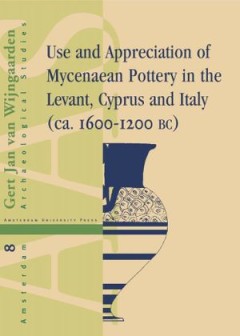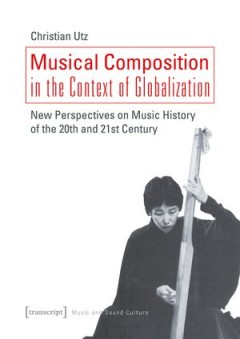Filter by

Renewable Economies in the Arctic
This book offers multidisciplinary perspectives on renewable economies in the Arctic and how these are being supported scientifically, economically, socially, and politically by Arctic states.The economic development of the Arctic region is witnessing new, innovative trends which hold promise for the sustainable development of the region. This book discusses the emerging forms of renewable econ…
- Edition
- -
- ISBN/ISSN
- 9781000464603
- Collation
- -
- Series Title
- -
- Call Number
- 900 REN r

Use and Appreciation of Mycenaean Pottery in the Levant, Cyprus and Italy
Pottery made in the aegean during the Late Bronze Age has been found widely distributed in many parts of the Mediterranean. At some four hundred sites outside Greece, Mycenaean dinner and storage vessels, as well as some figurines have been discovered. As such, this class of archaeological artifacts constitutes one of the main sources by which to study Mycenaean trade and interregional contact.…
- Edition
- -
- ISBN/ISSN
- 9789053564820
- Collation
- -
- Series Title
- -
- Call Number
- 930.1 WIJ u

The Thought Remolding Campaign of the Chinese Communist Party-state
In its comprehensive analysis of a wide range of primary and secondary sources in both Chinese and Western languages, this authoritative work stands as the definitive study of the theory, implementation and legacy of the Chinese Communist Party's thought-remolding campaign. This decades-long campaign involved the extraction of confessions from millions of Chinese citizens suspected of heterodox…
- Edition
- -
- ISBN/ISSN
- 9789089644107
- Collation
- -
- Series Title
- -
- Call Number
- 909.82 PIN t

Native Peoples of North America
Native Peoples of North America is intended to be an introductory text about the Native peoples of North America (primarily the United States and Canada) presented from an anthropological perspective. As such, the text is organized around anthropological concepts such as language, kinship, marriage and family life, political and economic organization, food getting, spiritual and religious pract…
- Edition
- -
- ISBN/ISSN
- -
- Collation
- -
- Series Title
- -
- Call Number
- 970 STE n

Bally - A History of Footwear in the Interwar Period
Carl Franz Bally founded a shoe factory in Switzerland in 1851. Within decades, the Bally name had achieved worldwide recognition for its high-quality footwear. The history of modern footwear can be traced through the lens of Bally's corporate evolution. This book brings together the results of research on such topics as the economic importance of fashion, Bally's fortunes in the US, the career…
- Edition
- -
- ISBN/ISSN
- 9783839457382
- Collation
- -
- Series Title
- -
- Call Number
- 900 BAL b

Imagining Unequals, Imagining Equals: Concepts of Equality in History and Law
Why did »equality« become prominent in European societies based on hierarchy during the Enlightenment? What does »equality« imply for societies, politics, or legal systems? The contributors to this volume draw on various historical case studies, from visionary practices in revolutionary France and the collection of data on the poor in 19th-century Germany, to claims raised under the minorit…
- Edition
- -
- ISBN/ISSN
- 9783839458877
- Collation
- -
- Series Title
- -
- Call Number
- 900 IMA i

The Wealthy, the Brilliant, the Few: Elite Education in Contemporary American…
How does the US make sense of its elite educational system, given that it seems to be at odds with core American values, such as equality of opportunity or upward mobility? Sophie Spieler explores scholarly and journalistic investigations, self-representational texts, and fictional narratives revolving around the Ivy League and its peers in order to understand elite education and its peculiar p…
- Edition
- -
- ISBN/ISSN
- 9783839457290
- Collation
- -
- Series Title
- -
- Call Number
- 973 SPI w

Scattered Finds : Archaeology, Egyptology and Museums
Scattered Finds explores the politics, personalities and social histories that linked fieldwork in Egypt with the varied organizations around the world that received finds. Case studies range from Victorian municipal museums and women’s suffrage campaigns in the UK, to the development of some of the USA’s largest institutions, and from university museums in Japan to new institutions in post…
- Edition
- -
- ISBN/ISSN
- 9781787351400
- Collation
- -
- Series Title
- -
- Call Number
- 900 STE s

Musical Composition in the Context of Globalization: New Perspectives on Musi…
Since the early transformation of European music practice and theory in the cultural centers of Asia, Latin America, and Africa around 1900, it has become necessary for music history to be conceived globally - a challenge that musicology has hardly faced yet. This book discusses the effects of cultural globalization on processes of composition and distribution of art music in the 20th and 21st …
- Edition
- 1
- ISBN/ISSN
- 9783839450956
- Collation
- -
- Series Title
- -
- Call Number
- 780 UTZ m

Music - Media - History: Re-Thinking Musicology in an Age of Digital Media
Music and sound shape the emotional content of audio-visual media and carry different meanings. This volume considers audio-visual material as a primary source for historiography. By analyzing how the same sounds are used in different media contexts at different times, the contributors intend to challenge the linear perspective of (music) history based on canonic authority. The book discusses A…
- Edition
- 1
- ISBN/ISSN
- 9783839451458
- Collation
- -
- Series Title
- -
- Call Number
- 780 MUS m
 Computer Science, Information & General Works
Computer Science, Information & General Works  Philosophy & Psychology
Philosophy & Psychology  Religion
Religion  Social Sciences
Social Sciences  Language
Language  Pure Science
Pure Science  Applied Sciences
Applied Sciences  Art & Recreation
Art & Recreation  Literature
Literature  History & Geography
History & Geography